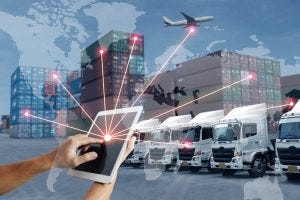Content Spotlight
Podcast: MilliporeSigma says education vital to creating unbreakable chain for sustainability
MilliporeSigma discusses the importance of people, education, and the benefits of embracing discomfort to bolster sustainability efforts.

With biopharma operations still affected by coronavirus, governments and industry must look ahead to ensure the security of manufacturing resources and supply chain structures, says Samsung Bioepis.
Like other companies, 2020 has been a challenge for Samsung Bioepis with the global coronavirus pandemic laying waste to ‘normal’ business procedures and supply chain management.
“We’ve supplied more than 18 million units of product worldwide since 2016 without experiencing any supply shortages in providing our products to customers and patients,” Kevin Jack, head of Alliance Management and VP of EU Manufacturing Operations at Samsung Bioepis told Bioprocess Insider.

Image: iStock/the.epic.man
“In terms of COVID-19 it’s definitely had an impact initially on the way we interacted with our manufacturing partners. Prior to the start of the epidemic, we would have numerous visits to manufacturing sites working directly with our partners at their facilities. However, due to severe travel restrictions, we’ve moved from these face-to-face interactions to more online and telephone conferences.”
With four products available commercially across numerous regions, Samsung Bioepis – a joint venture between Samsung Biologics and Biogen – is one of the most successful developers of biosimilar products. While the Korea-based firm has internal pre-clinical, clinical, and process development capabilities, the firm relies on various contract development and manufacturing organizations (CDMOs) to produce its biosimilars.
Some manufacture takes place at Samsung Biologics’ facilities in Incheon, South Korea. The former Biogen facility in Hillerod, Denmark – now owned by Fujifilm Diosynth Biotechnologies – is also a named outsourcing partner. The firm has not divulged any other manufacturing partners but told us it follows both a “near-market” (i.e. regional) and a “dual” manufacturing strategy to ensure the security of its supply.
From a cost perspective, COVID-19 has made sustaining operations and ensuring supply in this way more expensive, Jack said.
“We’re spending more resources to double, and triple check our work and spending additional costs on air freighting and expediating supplied raw materials from suppliers sites, due to cancellation of commercial airlines or limiting trucking routes, drivers to support deliveries. We’re putting more effort and energy into our way of operating to ensure that we minimize a potential impact to product supply.”
Managing supply chains in this way is not sustainable in the long-term, especially with COVID-19 showing no signs of abating. Jack, therefore, called for joint efforts between the pharmaceutical industry and governments to ensure that manufacturing resources and supply chain structures which support these operations are continuously supported and do not break down.
“We’re talking about supply logistics, flights, trucks or even support for manufacturing regular raw materials and API’s, in addition to prioritizing the production of COVID-19 vaccines and therapies. It’s not an issue that Samsung Bioepis alone can tackle. I think, from the pharmaceutical industry, there’s going to be a much more concerted effort needed and discussions with governments.”
While he said some of these discussions are going on at regional and local levels, for now there is not a lot of international discussion taking place.
“So for now, in order to meet our patients’ demands and their need for medicines, we’ll continue to work to ensure that we mitigate against potential supply issues. This means holding additional safety stocks where this is necessary until the pandemic situation allows us to get back to our normal lead times and normal way of doing things with our partners.”
You May Also Like